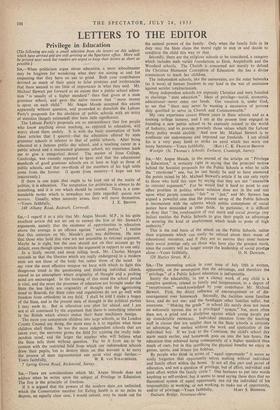SIR, —The interesting article in your issue of July 10th is
written, apparently, on the assumption that the advantage, and therefore the " privilege," of a Public School education is indisputable. Surely the educability, to use a clumsy word, of any child is a complex question, related to family and temperament, to a degree of " receptiveness," unacknowledged by your contributor Mr. Michael Stewart. First, the direct influence of encouragement or of dis- couragement over homework. Secondly, the facilities some families have, and do not use; and the handicaps other families suffer, but overcome. " Making the grade " in school life surely does not mean an automatic success due to .a privileged " system,4' but, more often than not, a grind and a discipline against which young people put up considerable resistance. Individual attention from- the teaching staff in classes that are smaller than in the State schools is certainly an advantage, but useless without the work and application of the individual boy. If we look to the Continent, the child's school day starts much earlier, and homework goes on into the late hours, the education thus achieved being consequently of a higher standard than much of ours, but in this sacrificing the physical benefits we enjoy in games, sports, and leisure for hobbies.
By people who think in terms of " equal opportunity " it seems so easily forgotten that opportunity solves nothing without individual and family effort within the home. Is not all this part and parcel of education, and not a question of privilege, but of effort, individual and joint effort within the family circle One hesitates to put into words anything so self-evident, but it seems to need saying these days that no theoretical system of equal opportunity can rid the individual of his responsibility .in working, or not working, to make use of opportunity,


























 Previous page
Previous page